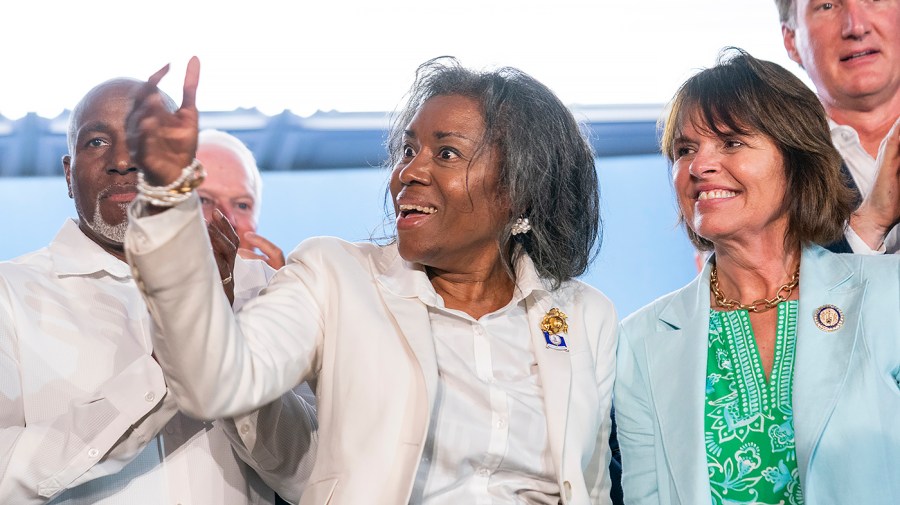Earle-Sears's Cultural Focus in Virginia Could Backfire

Cultural Issues as a Central Focus in Virginia's Gubernatorial Race
In the ongoing battle for Virginia’s governorship, Lieutenant Governor Winsome Earle-Sears (R) has made cultural issues a central part of her campaign. This approach has drawn both support and criticism, especially as the race unfolds in an off-year election where economic concerns are expected to dominate voter priorities. Earle-Sears has specifically targeted her Democratic opponent, former Rep. Abigail Spanberger, over policies related to transgender rights, particularly in schools.
Her campaign has launched several advertisements that frame Spanberger as being in favor of allowing “men in girls’ locker rooms” and enabling parents to be unaware when their children seek gender-affirming care. Another ad accuses Spanberger of wanting “boys to play sports and share locker rooms with little girls.” These messages have been designed to tap into broader conservative sentiments about gender identity and school policies.
This strategy has proven effective for Republicans in recent elections, including Gov. Glenn Youngkin’s 2021 win, which was partly fueled by appeals to parents’ rights. However, some analysts question whether this focus on trans issues is resonating with voters who are more concerned about the cost of living, jobs, and other economic factors.
One GOP strategist noted that Earle-Sears’s campaign lacks a clear, overarching message or vision for the future. Instead, it has been reactive, relying heavily on attacks against her opponent rather than offering a positive platform. “When you don’t have your own message or brand, you’re at the whim of the national winds,” the strategist said.
The issue of transgender individuals in public spaces has also become a point of contention. Recently, Governor Youngkin addressed reports that a registered sex offender, identified as transgender, had been accused of exposing himself to multiple women and children at Arlington Public Schools. He warned Virginia parents that their children’s safety is at stake and urged them to vote accordingly. Earle-Sears echoed these concerns on social media, accusing Spanberger of supporting policies that allow “predators like Richard Cox” to be considered real women.
Youngkin’s 2021 victory was built in part on the theme of parents’ rights, as many families became more involved in their children’s education during the pandemic. The debate over what should be taught in schools became a key issue in that race, especially after Youngkin’s opponent, Terry McAuliffe, suggested that parents should not dictate what schools teach.
Republicans have continued to highlight transgender issues in 2024, particularly in the context of sports. Polls indicate that a majority of Americans believe athletes should only compete on teams that align with their gender at birth. Some Virginia Republicans argue that this issue is not just a partisan concern but one that cuts across party lines.
Zack Roday, a Republican strategist who worked with Youngkin’s campaign, said the Earle-Sears team is smart to focus on this issue because it is easy to explain to voters. “This is such an opportunity for Democrats,” he added, noting that Virginia could serve as a test case for national politics following a presidential election.
An NBC News poll found that 75 percent of Americans do not support allowing transgender women to participate in women’s sports, while 25 percent do. Mark Harris, a senior strategist for Earle-Sears, emphasized that expanding the Republican coalition is a key goal, citing broad support among Virginians who disagree with progressive policies.
Spanberger, however, has taken a different approach. In an interview with WSET-TV, she discussed how Virginia previously handled transgender athletes and bathroom access on a case-by-case basis, involving input from schools, parents, and coaches. She said she would support legislation that allows for local decision-making based on factors like age, sport type, and competitiveness.
As a mother of three daughters, Spanberger emphasized her understanding of parental concerns about safety and fairness. She argued that the previous system, which lasted for 10 years, worked well and should continue.
Meanwhile, Spanberger has focused on economic issues, particularly the impact of the Trump administration’s Department of Government Efficiency (DOGE) on Virginia’s economy. The state is home to many federal employees due to its proximity to Washington, D.C., and its military presence.
Recent polls show that economic concerns are top of mind for Virginia voters. A Christopher Newport University poll found that 21 percent of voters cited inflation and the cost of living as their primary concern, followed by threats to democracy and other issues.
Despite the focus on trans issues, Spanberger’s campaign has gained traction in the polls. According to the Decision Desk HQ polling average, she currently leads Earle-Sears with 50.1 percent support to 43.1 percent.
Some Republicans suggest that focusing on transgender issues may not be enough in this cycle. One strategist noted that Youngkin’s 2021 campaign had a broader vision, including plans for education, the economy, and repealing the grocery tax.
Earle-Sears’s allies claim she is addressing other issues, such as the gas tax and high electricity bills caused by the Virginia Clean Economy Act. “Voters can walk and chew gum at the same time,” said Harris.
However, veteran political analyst Bob Holsworth criticized the Earle-Sears campaign as “one-note,” pointing out that much of her messaging focuses on Spanberger and the issue of boys in girls’ locker rooms. “It just seems to me that this is not the dominant issue in Virginia today,” he said.
Post a Comment for "Earle-Sears's Cultural Focus in Virginia Could Backfire"
Post a Comment